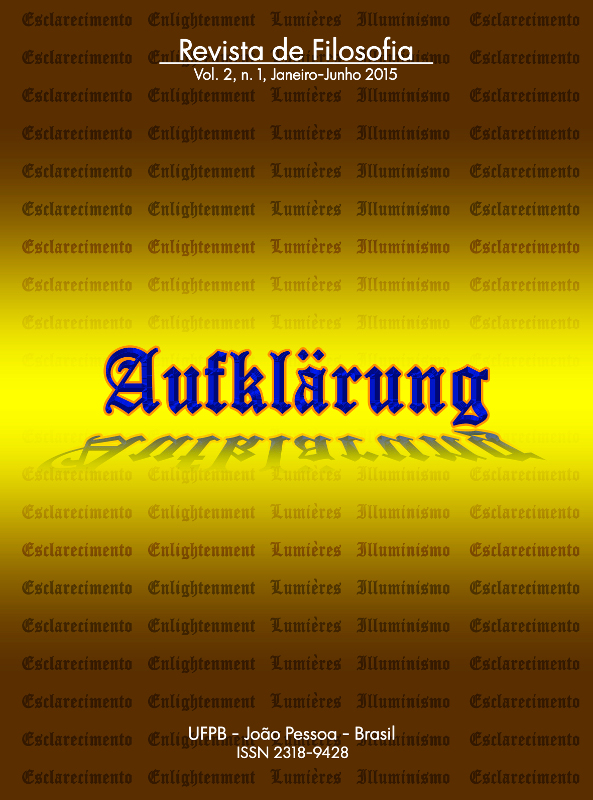Death of popular sovereignty? Reflections on our (post) democratic condition
DOI:
https://doi.org/10.18012/arf.2016.22585Palavras-chave:
democracy, globalization, neoliberalism, political equality, popular sovereigntyResumo
Death of popular sovereignty? Reflections on our (post) democratic conditionIn this article I try to answer a specific question: is it possible to recover the value and determinant role of the concept of popular sovereignty, in the actual condition of contemporary democracies? Assuming that it is still possible (and desirable) to recover this ideal and regulative principle, I want to explore the conditions that are available today in order to do so. That implies, first and foremost, to critically expose the eminent dangers brought by globalization and the new neoliberal imperialism. These put into question the set of fundamental democratic aspirations of freedom, equality and social justice. Under this light, to question about the conditions of possibility for popular sovereignty means to questions about the conditions of possibility for democracy itself. We will only be capable of recuing democracy if we redefine: a) the relationship between individual and community; b) the relationship between democratic nations and non-democratic global organizations; c) the space where democracy should take place (from nation-state to local communities). This article has four moments. First, I offer a brief reading of the concept of popular sovereignty in modernity, having as main reference Rousseau. In the second moment I characterize contemporary democratic constellation in its dialogue between Bernard Manin (1997) and Nadia Urbinati (2006). In the third moment I focus on the tension between democratic ideals and neoliberal hegemony. Finally,
I look into the conditions of possibility for rescuing democracy and popular sovereignty.
democracy; globalization; neoliberalism; political equality; popular sovereignty
Downloads
Referências
AVRITZER, Leonardo, “Democracy beyond aggregation: the participatory dimension of public deliberation” in Journal of Public Deliberation, vol. 8, iss.2, article 10, 2012. Available at: http://www.publicdeliberation.net/jpd/vol8/iss2/art10
AVRITZER, Leonardo, Participatory Institutions in Democratic Brazil, John Hopkins University Press, Baltimore, 2009.
BARBER, Benjamin, “Shrunken Sovereign: Consumerism, Globalization, and American Emptiness” in World Affairs, Spring 2008, available at http://www.worldaffairsjournal.org/article/shrunken-sovereign-consumerism-globalization-and-american-emptiness (accessed in July 5, 2014)
BARBER, Benjamin, If Mayors ruled the world, Yale University Press, 2013.
BARBER, Benjamin, Strong Democracy, University of California Press, 2003.
HARVEY, David, A Brief history of neoliberalism, Oxford University Press, Nova Iorque, 2011.
MANIN, Bernard, The Principles of Representative Government. Cambridge: Cambridge University Press, 1997
NUNES DA COSTA, Marta, ”How participatory budgeting changes the meanings and practices of citizenship” in Ethica – International Journal for Moral Philosophy, vol. 12, n.2, pp. 302- 320, 2013(a)
NUNES DA COSTA, Marta, Modelos Democráticos, Arraes Editores, Belo Horizonte, 2013(b)
ROUSSEAU, J.J., The Social Contract, Penguin Books, London, 1968.
SIMPSON, Matthew, ‘A Paradox of Sovereignty in Rousseau’s Social Contract’ in Journal of Moral Philosophy, vo.3 (1), 2006, pp.45-56
URBINATI, Nadia, Representative Democracy, Chicago University Press, Chicago, 2006.
Arquivos adicionais
Publicado
Como Citar
Edição
Seção
Licença
Política de Direito Autoral para os itens publicados pela Revista:
1.Esta revista é regida por uma Licença da Creative Commons aplicada a revistas eletrônicas. Esta licença pode ser lida no link a seguir: Creative Commons Attribution 4.0 International (CC BY 4.0).
2.Consonante a essa politica, a revista declara que os autores são os detentores do copyright de seus artigos sem restrição, e podem depositar o pós-print de seus artigos em qualquer repositório ou site.
Política de Direito de Uso dos Metadados para informações contidas nos itens do repositório
1. Qualquer pessoa e/ou empresa pode acessar os metadados dos itens publicados gratuitamente e a qulquer tempo.
2.Os metadados podem ser usados sem licença prévia em qualquer meio, mesmo comercialmente, desde que seja oferecido um link para o OAI Identifier ou para o artigo que ele desceve, sob os termos da licença CC BY aplicada à revista.
Os autores que têm seus trabalhos publicados concordam que com todas as declarações e normas da Revista e assumem inteira responsabilidade pelas informações prestadas e ideias veiculadas em seus artigos, em conformidade com a Política de Boas Práticas da Revista.






































